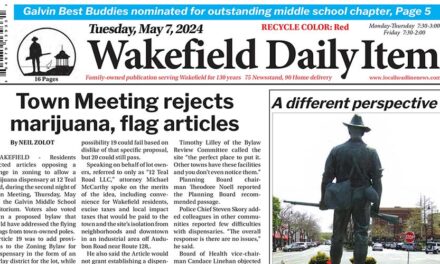Published in the July 6, 2021 edition.
WAKEFIELD — The group involved in an hours-long armed standoff with Massachusetts State Police that shut down the local stretch of Route 128 Saturday morning were due to appear in court today.
Eleven people were taken into custody at the end of the surreal incident, which required authorities to order some Wakefield and Reading residents living near Route 128 to stay in their homes and to close the busy interstate on Fourth of July weekend.
Of the 11, one is a minor who was released to the custody of parents. Two others have refused to give police their names.
They were scheduled to be arraigned in the temporary Malden District Court in Medford.
The situation was resolved “through negotiation and tactical maneuvers,” Massachusetts State Police Colonel Christopher Mason said on Saturday, adding that the group members “surrendered without incident.”
Mass. State Police released the names of eight of the individuals.
Those arrested are:
• Jamhal Tavon Sanders Latimer, also known as Jamhal Talib Abdullah Bey, 29, of Providence, Rhode Island.
• Robert Rodriguez, 21, of the Bronx, New York
• Wilfredo Hernandez, also known as Will Musa, 23, of the Bronx, New York
• Alban El Curraugh, 27, of the Bronx, New York
• Aaron Lamont Johnson, also known as Tarrif Sharif Bey, 29, of Detroit, Michigan.
• Quinn Cumberlander, 40, of Pawtucket, Rhode Island.
• Lamar Dow, 34, of the Bronx, New York
• Conrad Pierre, 29, of Baldwin, New York.
The men were all charged with unlawful possession of a firearm, eight counts; unlawful possession of ammunition; use of body armor in the commission of a crime; possession of a high capacity magazine; improper storage of firearms in a vehicle; and conspiracy to commit a crime.
In addition to the other charges, Hernandez, Johnson, Dow and the juvenile are charged with furnishing a false name to police.
The 10 adults were ordered held at the Billerica House of Correction on $100,000 cash bail.
A Massachusetts State Police trooper came upon the group traveling northbound on Route 128 not far from the Hopkins Street bridge at approximately 1:30 a.m. on Saturday while they were attempting to refuel their vehicles, authorities say.
The occupants of the vehicle were dressed in military-style tactical gear. Some had long rifles, some pistols and “some had a combination of both,” Mason told reporters on Saturday.
The trooper asked members of the group to produce licenses for the firearms and members of the group indicated they weren’t licensed or didn’t have copies of licenses on them.
“You can imagine 11 armed individuals standing with long guns slung on an interstate highway at two in the morning certainly raises concerns and is not consistent with the firearms laws we have in Massachusetts,” Mason said.
The trooper requested backup. A nine-hour standoff followed between the men – some of whom remained by their vehicles, others who went into a nearby wooded area in Wakefield – that shut down both sides of the interstate and led police to issue a warning for nearby residents.
Wakefield Police said the men claim “to be from a group that does not recognize our laws.”
The department added early Saturday, in a statement. “No threats were made, but these men should be considered armed and dangerous. We are asking residents in these areas to lock their doors and remain inside their homes. A heavy police presence will be in this area as well.”
Police lifted the shelter-in-place order around 11:30 Saturday morning.
The individuals are members of Rise of the Moors, a group who identify as Moorish Americans.
“The Moorish sovereign citizen movement is a collection of independent organizations and lone individuals that emerged in the early 1990s as an offshoot of the antigovernment sovereign citizens movement, which believes that individual citizens hold sovereignty over, and are independent of, the authority of federal and state governments,” the Southern Poverty Law Center says of the movement. “Moorish sovereigns espouse an interpretation of sovereign doctrine that African Americans constitute an elite class within American society with special rights and privileges that convey on them a sovereign immunity placing them beyond federal and state authority.”
Video shot along the interstate shows men in military-style gear holding the Moroccan flag.
Jamhal Talib Abdullah Bey, who is identified on the group’s website as the Moorish American Consular Post Head for the Rise of the Moors, communicated with the public during the standoff via YouTube videos uploaded from the interstate.
“We’re not anti-government, we’re not anti-police, we’re not sovereign citizens, we’re not Black-identity extremists,” Bey said in one video.
He believes the group was traveling legally by abiding by federal laws, though not acknowledging Massachusetts laws which he does not believe apply to the group.
While showing inside of one of the vehicles, he shows multiple fuel canisters which the group intended to use to refuel rather than stopping at a gas station off the interstate.
“Police seen us on the side of the road with our guns secured,” he said in the video. “We were afraid so we got out with our arms.”
A gun owner is allowed to transport a weapons under specific conditions. For a loaded or unloaded handgun, it may be on a person or in a vehicle if under “direct control.”
Large-capacity rifles and shotguns must be transported unloaded and in a locked case, locked trunk or other secure container, according to state regulations.
State law considers a large-capacity firearm to be any of the following: semi-automatic handgun or rifle that is capable of accepting more than ten rounds, a semi-automatic shotgun capable of accepting more than five shotgun shells or an assault weapon.
A rifle with a fixed tubular magazine designed to accept, and capable of operating only with, .22 caliber ammunition is not classified as a large-capacity firearm.
A person can carry a loaded or unloaded rifle or shotgun upon or across a public way if they are engaged in hunting and hold a valid hunting license.
Non-residents do not need a firearms license to transport their firearms in or through the commonwealth, provided their firearms are unloaded and enclosed in a case while traveling.
The group was traveling from Rhode Island to Maine to train on “private land,” the group told police. In one of the videos recorded during the standoff with police, Bey said the vehicles contain camping equipment.
The Rise of the Moors website listed the organization as being based from a multi-family home in Pawtucket, Rhode Island.
— Michelle Williams of MassLive.com contributed to this report.




